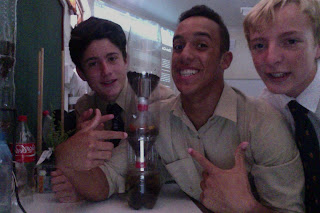Was our eco-column really successful?
The plants
grew well and there were living organisms in both our aqua and terra zones.
Over the holiday period the radish plants died and the soil in terra zone dried out. It was
successful in the way that fungus grew on the side of the decomp zone and there
were still living organisms in the aqua zone.
Michael Peter
What we have learned
Michael Peter:
I have a much better understanding of the ecosystem and the different zones and
how they work. I learnt that an ecosystem needs resources such as water and
oxygen etc in order to sustain itself.
Sebastian Prentice: I have a better understanding
because through making the eco-column it gave me a better understanding of the
different jobs and responsibilities the different zones have.
Jonny Frost: Looking
after and creating our eco-column has given me more knowledge of ecology and
ecosystems. Now I know that that the biotic factors of an ecosystem are
dependent on the abiotic factors and how it works in a cycle.
Did we work as a team?
Sebastian Prentice:
Our group worked well together because we all assigned each other separate jobs
to do for the project. The work load was evenly distributed and we all did
our parts well and did not let each other down.
Jonny Frost: Our group members worked well
together and I think that our blog represents this and what we learned
throughout the term. We worked together to complete each task set and succeeded.
Michael Peter: our group worked well together as everyone did the work they were assigned and no complications took place. Our eco-column ended up very well and our blog was also a success.



